Whether you’re reading the Washington’s Post’s article about “how the baby food industry hooks toddlers on sugar”; Bloomberg’s piece on how baby food how too much sugar or reading one of the many articles about the processing behind traditional jars and pouches – it can leave you feeling overwhelmed and a bit scared. The question remains, if the traditional jars and pouches are rumored to be bad for your baby – what are you supposed to feed your baby?
At Amara, we decided to dive into the studies that is causing all the recent media about the high levels of sugar in baby food. We want to give you the science behind the news so that we can help you get the information to make the decision on what you’re supposed to feed your baby. After all, you know your baby best.

Early Taste Experiences and Later Food Choices.
We all know that we should be feeding our baby healthy food but the link between healthy food and healthy babies is actually stronger than we think. In 2017, De Cosmi, Scaglioni, and Agostini highlighted the importance of nutrition and baby food in later food choices. They showed that food preferences are formed in infancy and are critical to prevent obesity later in life and encourage healthy food choices.
You know when your toddler begs for that candy bar at the check out aisle? They actually found that children are predisposed to prefer sugary and salty foods. It’s much easier to introduce sugary foods than savory. But, the good news is that they also found that repeated offerings of foods can modify those innate preferences. So, while it may take up to 10 tries for your baby to like a new food – don’t give up. The foods you expose your baby and your toddler to early in life will help shape their future food preferences and healthy habits as an adult.
How Much Sugar is Recommended for Children Younger Than 2 Years Old?
For children and adolescents from 2-18 years old, the WHO recommends that free sugar intake should be less than 5% of total calories consumed. But what about for babies?
In a study in the Journal of Pediatric Gastroenterology and Nutrition by Regina Vitolo, the recommended daily intake of sugar for babies and infants is addressed. Here’s the thing though, there is no “safe” amount of sugar for this age group because the science leads us to discourage exposure of sweet taste early in life.
The statement that we love most at Amara organic foods is the recommendation from the American Heart Association: “Because there is minimal room for nutrient-free calories in the habitual diets of very young children, added sugars should be avoided in the diet of children less than 2 years of age”.
Bottom line, babies and toddlers don’t have room in their bellies to eat that much food, let’s make sure that the calories and nutrients they are getting are the best to help them grow into healthy kids and adults. That means there is no recommended sugar level for baby's younger than 2 years old - it's best to avoid added sugars and hidden concentrated sugars altogether.
Nutrient Content of Squeeze Pouch Foods for Infants and Toddlers Sold in the United States
Before we dive into this study we want to say one thing. We know as a parent you deeply care about the health of you baby. From pinterest to instagram, there is a "golden standard" of homemade baby food. But, we also know how hard it is to make homemade, fresh baby food every day for your baby. Each and every parent is doing the best they can for their baby but sometimes homemade baby food seems like more of a dream than a reality. That’s why we started Amara, to make homemade meals, possible. We want to bring you convenience, without the compromise.
When you go to the grocery stores the majority of what you see today is squeeze pouches and jars so we understand that sometimes it’s the easiest choice. In a study from Beauregard and Bates et al, they dove into the nutrient content of squeeze pouches sold in the United States. Their goal was to describe the availability and nutrient composition of the commercially available squeeze pouches and toddler foods. They did a deep dive – they studied 703 ready to serve pureed foods from 24 major brands. The results?
They saw little differences between one squeeze pouch versus another and concluded that squeeze pouches in the fruits and vegetable categories were more likely to contain added sugars than other package types.
"Free sugars" and "added sugars" sometimes aren't easy to find blatantly on the nutritional label - they can include the sugars naturally present in fruit juices or fruit concentrates. A complementing study shows that baby food pouches are predominantly extremely high in sugar content, making up almost 90% of the total energy content (Koletzbo, Buhrer, Ensenauer et al.). It goes unsaid that while convenient, squeeze pouches should be looked at as an occasional consumption rather than an every day.
Our goal in this blog was to summarize the studies behind the effects of sugars in your baby and toddler’s diet. That being said, it can be scary to look at the studies and our goal is NOT to make anyone feel guilty. As parents, each and every one of us are trying to do the best we can within the crazy schedule that is often those first 2 years of your baby’s life. And, quite frankly, it can be overwhelming or upsetting to read about baby food and all the different options available to you today.
At Amara, we want to give you an alternative to the conventional baby food out there, an alternative to making food from scratch. At Amara, we want to make homemade, possible. We believe moms shouldn’t have to choose between nutrition and convenience. You – and your baby – deserve both.
That’s why we created organic baby food blends with no added sugar and minimal processing. You, and your baby deserve the best.
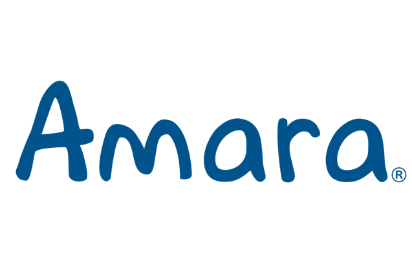
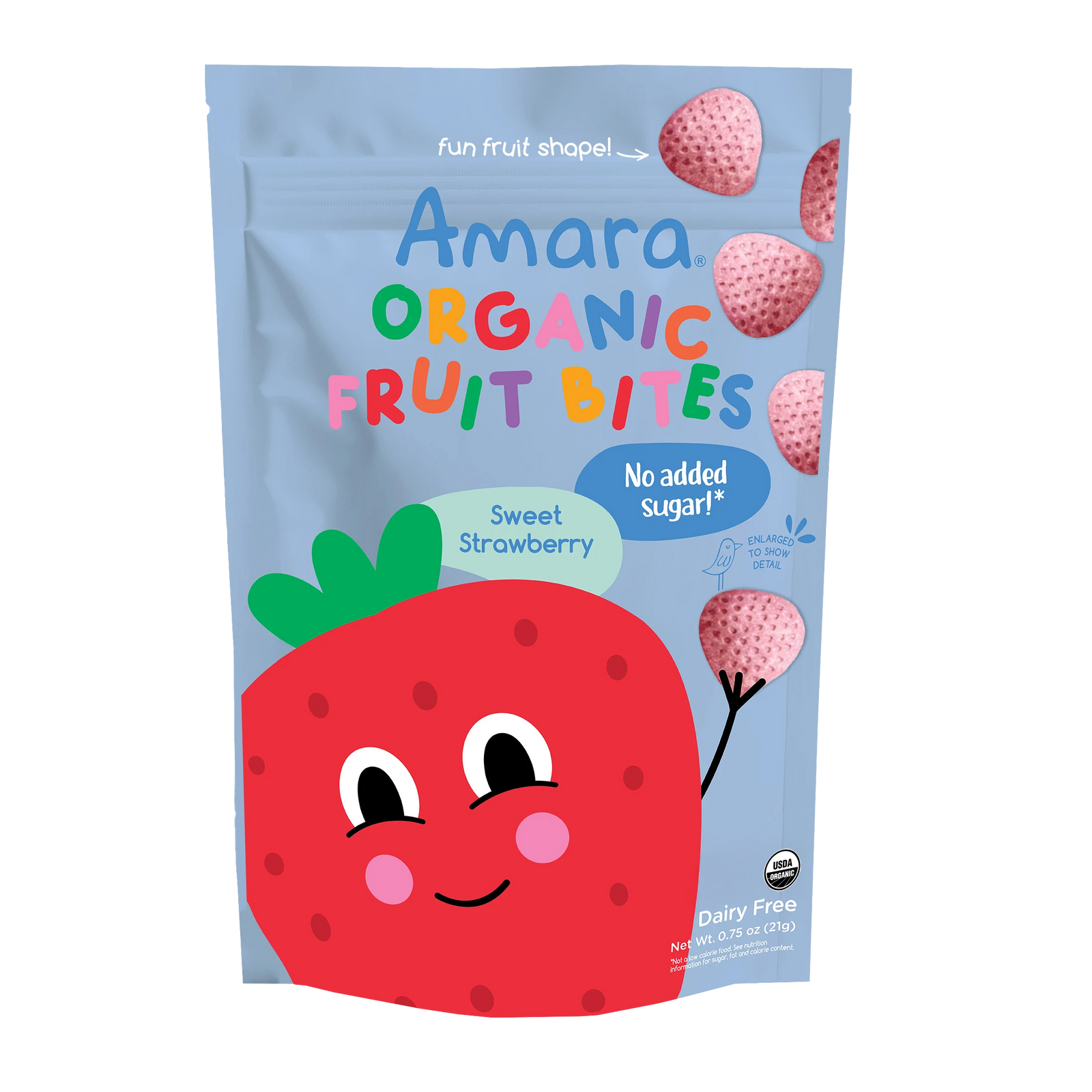


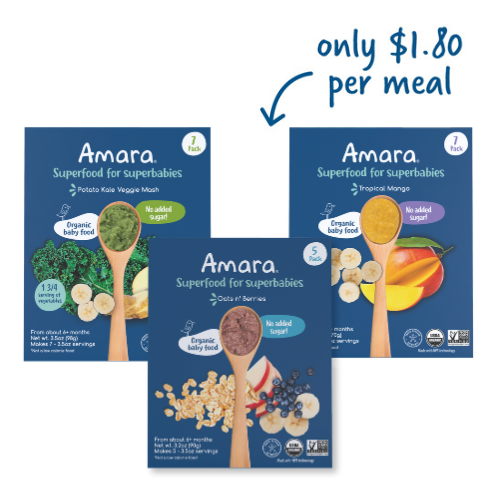
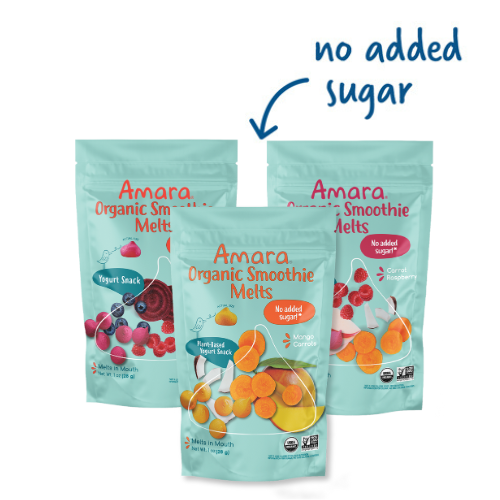
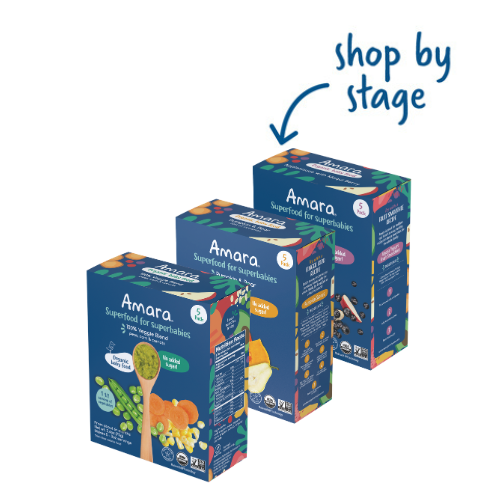
Leave A Comment